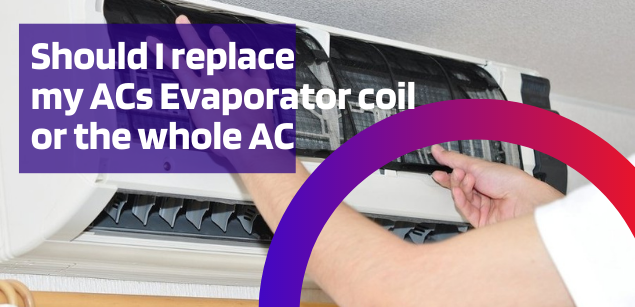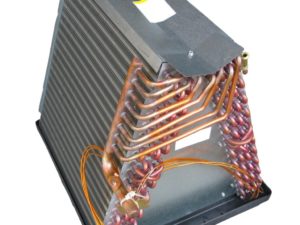Leonard Splaine Should I replace my ACs Evaporator coil or the whole AC

Knowing when to replace or repair your air conditioner (AC) is a common problem that many homeowners face. It’s also vital to know when to contact an AC repair company.
The air conditioner coil, or evaporator coil, in your AC system is one of its most critical components. A failed evaporator coil is one of those difficult situations where you really need to consider whether the repair is worth the cost involved in replacing the part.
In some situations, replacing just the evaporator coil means it will “mismatch” your condenser (the outside unit). And if the condenser and evaporator mismatch in either age, SEER or refrigerant, you’re going to run into problems like:
- High energy bills
- Frequent repairs
- Less comfort
- A unit that will die much earlier than it should
We’ll explain what we mean by “mismatching” coils and when you should replace the entire unit versus just the evaporator coil. But first, let’s take a quick look at what an evaporator coil does and how it can get damaged.
What does the Evaporator Coil do anyway?

An evaporator coil is the part of an air conditioner or heat pump that absorbs the heat and moisture from the air in your house.
Translation? Without the evaporator coil, your AC ain’t cooling your home.
Here’s how it works: Air conditioners don’t actually “produce” cold air in the way a furnace produces heat. Instead, they use refrigerant, or coolant, to absorb heat from the air, carry that heat outdoors, and release it into the air outdoors. The refrigerant circulates continuously to remove more and more heat from your home until your indoor air temperature reaches the one you’ve chosen on the thermostat.

Why would an evaporator coil need to be replaced?
The main reason that an evaporator coil would fail and need to be replaced is due to erosion.
Erosion causes the coils of the evaporator unit to weaken. Over time, the refrigerant flowing through the evaporator’s coils wears down the inner lining, making the coils weaker. In a weak state, the coil develops holes and cracks due to which the refrigerant leaks.
The weaker the coils, the more prone they are to developing refrigerant leaks. And once you have a refrigerant leak, it’s usually more cost-effective to completely replace the coil or entire unit than to repair the leak and recharge the unit with more refrigerant (especially if your AC takes R-22 refrigerant).
Replace the entire AC unit or just the evaporator coil?
Replacing the whole AC unit may seem any day a costlier option than just replacing the evaporator coil. But sometimes it is wiser to make this more expensive investment.
Your AC has two coils:
- The evaporator coil or the “inside coil”
- The condenser coil or the “outside coil”
These coils are both housed within the same AC unit but are still separate components that must work closely together to cool your home.
That said, replacing just one of these coils could cause major problems for your unit. Let’s take a closer look at when replacing the entire unit is more cost-effective.
You should replace the entire unit when…
1. Your AC is 8+ years (or older)
The efficiency of an AC unit is at its best for the first 10 to 12 years of its life. That said, if your AC is nearing 8 years old, replacing just the evaporator coil would be like putting a brand new engine into a dying car—it’s just not worth the money.
Changing the evaporator coil in such a case will put stress on the unit, and its efficiency of performance will decline steeply and lead to further troubles.
2. Obsolete Evaporator Coil
All ACs have a SEER (Seasonal Energy Efficiency Ratio) rating. Under ideal conditions, this rating should be anywhere between 13 to 21, which determines how efficient the unit is. The higher the SEER, the more efficient the unit (and the coil).
However, the federal minimum SEER is 14. But if you have an older unit, it could have a SEER rating that’s a lot lower than that. For example, if you have a 12-SEER unit that needs a replacement evaporator coil, it’s very possible that replacement 12-SEER coils for that model are obsolete and not made anymore. If this is the case, you’ll need to completely replace your unit—otherwise, you’d end up with an indoor and outdoor unit with mismatching SEER ratings.
So is it really all that bad if your AC coils are mismatched in SEER ratings? Yes.
Pairing an efficient 14-SEER coil with an older, less efficient coil is like installing a V10 engine in a 10-year-old minivan—you’re just not going to get the performance you’d expect from the engine, right?
Similarly, if you have a low-SEER outdoor coil that’s paired with a highly efficient indoor coil, the outdoor coil will drag down the performance of your indoor coil—which means you’ve wasted the money you just spent on your new evaporator coil.
3. Your AC unit uses R-22
R-22 is a refrigerant that is not being produced anymore. Since it is a form of chlorofluorocarbon, it harms the environment and therefore, has been phased out by almost all countries.
So If your unit uses R-22, your best option is to replace the entire unit with one that uses R-410A refrigerant.
With a complete ban on its production, R-22 is now very expensive and in the years to come, it will become impossible to get it anymore.
How To Avoid Damage To The Evaporator Coil?
Waiting for the damage to happen and then taking corrective action is not a sensible move.
Smartness would lie in ensuring that the evaporator coil does not suffer undue stress. For this, you need to get regular maintenance of your HVAC unit done by experts. Also, pay heed to their advice and do not try to do repairs on your own.
CONCLUSION
The above discussion would have given you a fair idea of the importance of the evaporator coil in your AC. It would also have enlightened you about when to replace the evaporator coil or whole unit.
Chances are you would get drawn to the option which costs you less. If that is the case, convince yourself whether you are making the right decision or not keeping in mind the age of your AC, its SEER rating, and the type of refrigerant used. When in doubt, always ask for professional help.
Your AC is an expensive piece of machinery so refrain from tinkering with it. A small fee of maintenance charge will save you from a huge amount paid on repairs.
You can easily book an appointment with us to get our expert opinion regarding what is the best option for you. It is not necessary that you will have to buy a new AC. A proper inspection of the existing unit is the only way to ensure that you cover all your bases while making the final decision.
